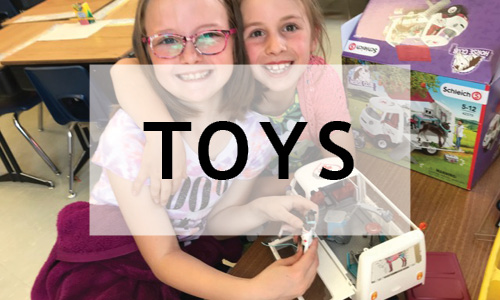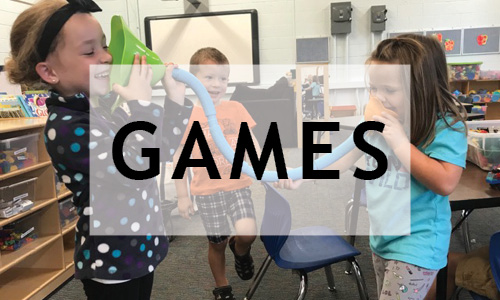 Every parent cringes when he hears his preschooler yell out, “Mine” while holding tight to a toy as his peer tries to wrestle it away. Giving up a treasured toy is tough on little ones, but learning to share is an essential lesson parents can teach over time. What should parents expect? And how do we help our egocentric two-year-old become a generous, sharing and caring kindergartner?
Every parent cringes when he hears his preschooler yell out, “Mine” while holding tight to a toy as his peer tries to wrestle it away. Giving up a treasured toy is tough on little ones, but learning to share is an essential lesson parents can teach over time. What should parents expect? And how do we help our egocentric two-year-old become a generous, sharing and caring kindergartner?
Sharing involves considering others outside your self-centered world—their feelings, needs and wants—by giving, caring, pleasing and including others. Two and three –year-olds have a hard time sharing, but as they develop into 4 and 5 year-olds and see themselves as part of a community, they learn to share.
Language is integral to learning to share. Modeling phrases such as “I am waiting my turn,” “You go next,” “Your turn” or “You can play with this,” “Thanks for waiting for your turn,” or “I’d like you to try this,” helps them understand the turn-taking process and label it. By talking through the emotions of sharing, “It feels good to give Sam a turn,” “I like to share and make Devon happy,” or “I helped James today and it felt good,” we help our children name their emotions, express themselves, and learn to get along with others using words.
5 Tips to Teach Your Preschooler to Share:
1. Model sharing throughout your day and talk about what you are doing withyour child. As an adult you can demonstrate sharing objects, ideas and time. When your neighbor asks to borrow some milk, you gladly share the half-gallon left in your refrigerator. Be consistent in your language and phrases so your child will learn and use them too. “I am glad that I can share with Mrs. Kennelly.”
Model sharing as a play partner with your child, using dolls, play figures or animals. Again, start a conversation and label taking turns, sharing and how good it feels to think of others. Share ideas with your child and encourage her to follow your example. During play you might take turns adding to the imaginary story or adding on to the dialogue in a puppet show. Adding physical touch to turn-taking with young children can reinforce the concept with them as you gently put your hand on her shoulder while saying, “Your turn to tell the story.”
2. Provide opportunities to share within the family, taking turns and giving each child a chance to go first. Putting a puzzle together involves teamwork, sharing and taking turns. Try a Family Fun Puzzle by Ravensburger. These jigsaw puzzles containing separate sections according to the size of the puzzle piece offers jumbo pieces for children as young as three, more complex mid-sized pieces for 6-10 year-olds and adult sized pieces to finish the picture. Everyone contributes at his own level and in his own space.
Playing beginner board games reinforces taking turns, waiting and encouraging others. Simple but engaging first games that I recommend are “Barnyard Bingo” by Fisher Price, “Diggity Dog” by International Playthings, “Snail Pace Race” and “Funny Bunny” by Ravensburger and “Pengoloo” and “Froggy Boogie” by Blue Orange Games.
Other multi-step activities to enjoy with your family are gardening, preparing food, making a family craft or creating and giving a gift. Each activity invites taking turns and following directions so family members learn to wait, listen to others and work together. Each step of assembling the ingredients to pot a plant, decorate sugar cookies or design a card for Nana involves sharing in the planning—“You get the spoon, I’ll get the bowl,” or “I’ll get the markers and you get the glitter.” Don’t forget to share ideas as you develop the project.
Finally, exchanging experiences at the dinner table or bedtime, draws a family close as they contribute what was fun or challenging during their day. Encouraging children to recount their experiences and feelings, not only teaches sharing, but also builds their language skills to verbally express and name their emotions such as “frustrated,” “embarrassed.” “excited,” or “silly.”
3. Practice and prepare your child before his play date. Talk about and practice sharing with some favorite toys and give your child the words to navigate sharing. If your child has an especially endearing toy, you might want to take it out of commission during the play date. Invite the friend to bring along some of his favorite toys to contribute so the sharing isn’t so hard on the host. Some parents have found a good solution to kids being unable to share, is to put the toy in time-out. Trade strategies with other parents and see what works best with your child. Giving him a concrete time period for sharing is helpful. You can use a timer to measure the length of a turn, but younger children understand a more concrete time measure like “5 pushes on the swing and then it is your turn,” or “When I finish singing Old MacDonald, then it will be your turn to play with the airplane.” Concrete language is easier for a young child to measure and understand than a more abstract concept such as 5 minutes. They understand the endpoint of “Five pushes” or “Count to 10.”xxx
4. Reinforce sharing with praise. Recognize when your child or a parent is sharing and label the experience with all the phrases that you typically use, “I like the way you shared your doll with Ling,” or “I bet that was hard to give up your truck for a few minutes, but Quinn is really happy to have a turn.” Don’t be afraid to use some adult vocabulary like “grateful,” “appreciate” and “pleased.” When you are first teaching the concept, keep your vocabulary consistent and limited in number so your child will learn the concept connected to the words. Then expand and use other words to name their “patience,” or “compassion.”
5. Read a story about sharing to learn the lesson through a book.
Mine! By Mathilde Stein: One night, ready to hop into bed, Charlotte found a little ghost under her covers. The only word he seems to know is, “Mine.” He grabs the covers, hoards the tub toys, is stingy with the sock pile and takes the toys. Patient Charlotte offers a rational reply to each act of selfishness. A friendship grows as the little ghost learns how to share and take turns.
The Boy Who Wouldn’t Share by Mike Reiss: Grumpy Edward, the keeper of the toys, will simply not share with his sister Claire—not his rocking horse, wizard’s hat or teddy bear. As he sits hidden inside his pile of toys, he misses out on a lovely chocolate treat while guarding his treasures. Claire, of course, doesn’t hold a grudge when her greedy brother has a change of heart and offers his tangle of toys to her for a day of creativity. Note: be sure to offer alternate language to the “Mine” reply that Edward uses repeatedly, such as “Let’s share.” “You take a turn.” “I am almost finished and you can play with this.”
It’s Mine! By Leo Lionni. Milton, Lydia and Rupert, three self-centered frogs claimed the water, earth and air as “mine!” on their little island in the middle of Rainbow Pond. Not until a torrential rain flooded and covered their land, did the three frogs have to huddle and share the last rock. As the sun dried their little island, the three pals realized it was much more peaceful to declare the island “Ours!”
Too Many Toys by David Shannon. Mom’s perturbed with a house packed with toys. Efforts to persuade Spencer to part with his alien space weapons or convoy of trucks meet with resistance from the toy hound. Each toy is attached to its giver and can’t be let go, “Not Mr. Fluffers! Mom how could you?” After much negotiation, a box of give-aways is compiled. Too bad Spencer can’t part with the best toy ever—the box!
That Toad is Mine by Barbara Shook Hazen. Two boy buddies think they know how to share—a book, a bike, a game and what they like. It wasn’t until an enticing toad appeared that they realized some things just can’t be shared. As they argue about who gets the toad, he gets away. But true friends can’t stay mad and soon they are sharing a kick of a rock “until their mad is gone.”
One of Each by Mary Ann Hoberman. Oliver Tolliver thinks he has a perfect life. Collecting all he needs in ones—a clock, a chair, a table, a bed, a pear, and a book—he’s forgotten to provide for a friend. His “lovely one of each” becomes a lonely place without someone to share it with. Learning his lesson, he changes his concept of perfect and gains some friends.
Take the lesson from these stories. It’s no fun unless you share.



